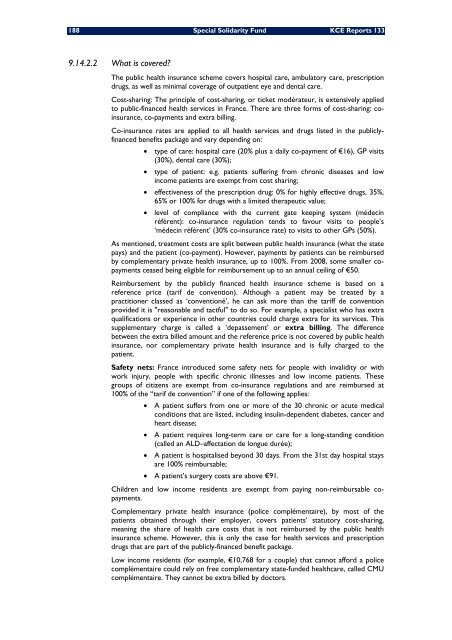Optimalisatie van de werkingsprocessen van het Bijzonder ... - KCE
Optimalisatie van de werkingsprocessen van het Bijzonder ... - KCE
Optimalisatie van de werkingsprocessen van het Bijzonder ... - KCE
Create successful ePaper yourself
Turn your PDF publications into a flip-book with our unique Google optimized e-Paper software.
188 Special Solidarity Fund <strong>KCE</strong> Reports 133<br />
9.14.2.2 What is covered?<br />
The public health insurance scheme covers hospital care, ambulatory care, prescription<br />
drugs, as well as minimal coverage of outpatient eye and <strong>de</strong>ntal care.<br />
Cost-sharing: The principle of cost-sharing, or ticket modérateur, is extensively applied<br />
to public-financed health services in France. There are three forms of cost-sharing: coinsurance,<br />
co-payments and extra billing.<br />
Co-insurance rates are applied to all health services and drugs listed in the publiclyfinanced<br />
benefits package and vary <strong>de</strong>pending on:<br />
• type of care: hospital care (20% plus a daily co-payment of €16), GP visits<br />
(30%), <strong>de</strong>ntal care (30%);<br />
• type of patient: e.g. patients suffering from chronic diseases and low<br />
income patients are exempt from cost sharing;<br />
• effectiveness of the prescription drug: 0% for highly effective drugs, 35%,<br />
65% or 100% for drugs with a limited therapeutic value;<br />
• level of compliance with the current gate keeping system (mé<strong>de</strong>cin<br />
référent): co-insurance regulation tends to favour visits to people’s<br />
‘mé<strong>de</strong>cin référent’ (30% co-insurance rate) to visits to other GPs (50%).<br />
As mentioned, treatment costs are split between public health insurance (what the state<br />
pays) and the patient (co-payment). However, payments by patients can be reimbursed<br />
by complementary private health insurance, up to 100%. From 2008, some smaller copayments<br />
ceased being eligible for reimbursement up to an annual ceiling of €50.<br />
Reimbursement by the publicly financed health insurance scheme is based on a<br />
reference price (tarif <strong>de</strong> convention). Although a patient may be treated by a<br />
practitioner classed as ‘conventioné’, he can ask more than the tariff <strong>de</strong> convention<br />
provi<strong>de</strong>d it is "reasonable and tactful" to do so. For example, a specialist who has extra<br />
qualifications or experience in other countries could charge extra for its services. This<br />
supplementary charge is called a ‘<strong>de</strong>passement’ or extra billing. The difference<br />
between the extra billed amount and the reference price is not covered by public health<br />
insurance, nor complementary private health insurance and is fully charged to the<br />
patient.<br />
Safety nets: France introduced some safety nets for people with invalidity or with<br />
work injury, people with specific chronic illnesses and low income patients. These<br />
groups of citizens are exempt from co-insurance regulations and are reimbursed at<br />
100% of the “tarif <strong>de</strong> convention” if one of the following applies:<br />
• A patient suffers from one or more of the 30 chronic or acute medical<br />
conditions that are listed, including insulin-<strong>de</strong>pen<strong>de</strong>nt diabetes, cancer and<br />
heart disease;<br />
• A patient requires long-term care or care for a long-standing condition<br />
(called an ALD–affectation <strong>de</strong> longue durée);<br />
• A patient is hospitalised beyond 30 days. From the 31st day hospital stays<br />
are 100% reimbursable;<br />
• A patient’s surgery costs are above €91.<br />
Children and low income resi<strong>de</strong>nts are exempt from paying non-reimbursable copayments.<br />
Complementary private health insurance (police complémentaire), by most of the<br />
patients obtained through their employer, covers patients’ statutory cost-sharing,<br />
meaning the share of health care costs that is not reimbursed by the public health<br />
insurance scheme. However, this is only the case for health services and prescription<br />
drugs that are part of the publicly-financed benefit package.<br />
Low income resi<strong>de</strong>nts (for example, €10,768 for a couple) that cannot afford a police<br />
complémentaire could rely on free complementary state-fun<strong>de</strong>d healthcare, called CMU<br />
complémentaire. They cannot be extra billed by doctors.

















